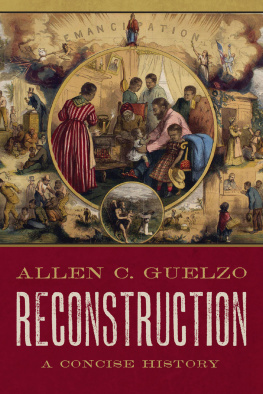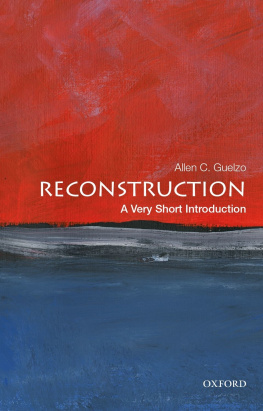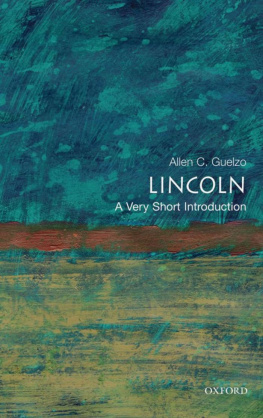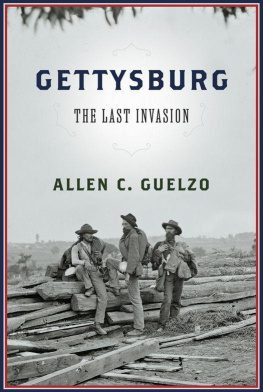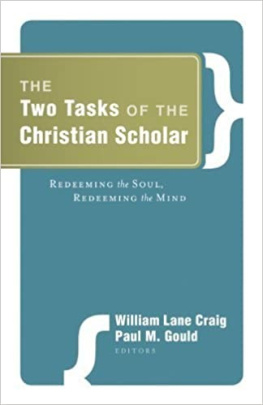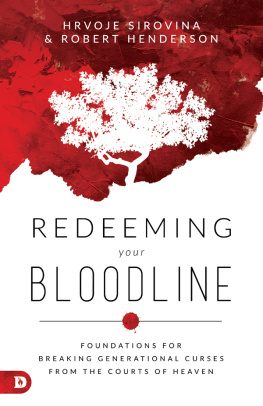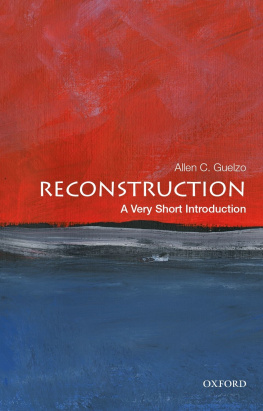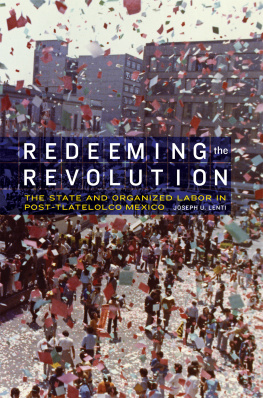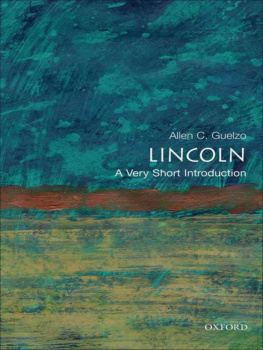Copyright 2016 by the President and Fellows of Harvard College
ALL RIGHTS RESERVED
Jacket illustration: Jacket painting by Ralph Elmer Clarkson (18611942), Portrait of Lincoln, ca. 1909, oil on canvas, 42 31-7/8", Collection of the Union League Club of Chicago, UL1909.3
Jacket design: Jill Breitbarth
978-0-674-28611-5 (cloth : alk. paper)
978-0-674-91504-6 (EPUB)
978-0-674-91503-8 (MOBI)
The Library of Congress has cataloged the printed edition as follows:
Guelzo, Allen C.
Redeeming the great emancipator / Allen C. Guelzo.
pages cm. (The Nathan I. Huggins lectures)
Includes bibliographical references and index.
1. Lincoln, Abraham, 18091865Views on slavery. 2. SlavesEmancipationUnited States. 3. United States. President (18611865 : Lincoln). Emancipation Proclamation. 4. Lincoln, Abraham, 18091865Influence. I. Title.
E457.2.G886 2016
973.7092dc23 2015017376
THESE LECTURES began their life as the 2012 Nathan I. Huggins Lectures at Harvard University, under the sponsorship of the W. E. B. Du Bois Institute for African and African American Research. There is an appropriateness to this set of circumstances. My first undergraduate research paper was written on Nathan Hugginss history of the Harlem Renaissance; and a portrait of W. E. B. Du Bois hangs in the Civil War Era Studies program office at Gettysburg College. And there are few, if any, pleasanter places in the groves of academe than Harvard, and particularly for me, having spent the 19941995 academic year there as a Fellow of the Charles Warren Center for American Studies. It was there that I hatched the first egg of my studies of Abraham Lincoln, a paper entitled Lincoln and the Doctrine of Necessity, which was subsequently published in the Journal of the Abraham Lincoln Association and which became the head from which sprang Abraham Lincoln: Redeemer President in 1999. I had not actually come to Harvard to write about Lincoln; I was pursuing a project at the University of Pennsylvania on the history of determinism and free will in American thought. I turned to Lincoln only because I knew that Lincoln had, early in his career as a politician, offered up some surprisingly sophisticated comments on the subject. The kind of book I had in mind at that point could do nothing but benefit from the juice it would enjoy from having Abraham Lincoln make a cameo appearance. But the reception of the article was far more interesting than I could have ever dreamt, and like the child who cannot get his hand out of the cookie jar, I found myself trapped with the guilty goods. I cannot, of course, complain at the result. It was probably a more typical Harvardian turn of events than I would have imagined.
To return to Harvard eighteen years afterward (with a few less demanding visits interspersed) had some of the elements of a reunion. My principal host was Henry Louis Gates Jr., Alphonse Fletcher University Professor at Harvard and the director of the Du Bois Institute, whom I first met, not at Harvard, but in Gettysburg while he was in the midst of filming his Public Broadcasting Service documentary Looking for Lincoln. I will acknowledge from the first the peculiar spell Skip Gates can cast, and admit that I can speak of no profounder mutual curiosity and fellowship than the one which we have shared. On the evening that I learned of his absurd arrest for the crime of entering his own home, I could think of no better message to send by e-mail than cuffed to you. I would say it again, and under virtually any other circumstances, too. I thank him in particular for the honor of delivering these lectures, both as a nonresident Fellow of the Du Bois Institute and as a friend.
Harvard also called me back into the fellowship of other friends, old and new. Principal among these is, and will always be, Professor James W. Hankins, founder and general editor of the I Tatti Renaissance Library, whom I have known for nearly all my life. Along with him stand Harvey Mansfield, Harvards William R. Kenan Jr. Professor of Government; William Julius Wilson, the Lewis P. and Linda L. Geyser University Professor at Harvard and the only sociologist I can honestly say that I have read and understood; and the Reverend Eugene F. Rivers, pastor of the Azusa Christian Community in Dorchester and cofounder of the Boston TenPoint Coalition. I had admired Gene Riverss work in the Boston area for many years, but from afar, remembering the years I had spent in ministry in west Philadelphia; when Gene introduced himself at the close of the first of these lectures, I almost involuntarily sank down on one knee in tribute. A real drama queen, yes, I know, but the gesture was the face on some long, deep meanings.
The Nathan I. Huggins Lectures take as their subject Abraham Lincoln and emancipation. In practice, however, they use Lincolns reputation as the Great Emancipator as a revelation of markers in cultural maturation, and especially our perceptions of race and responsibility. I have no particular agenda or solution for the ongoing agony of racial inequality to promote. Every such cure I have seen and heard over the decades has usually broken down in one way or another. Moments of optimism that the cloud of racial antagonism is lifting get sharply reined in by unlooked-for interpositions of evil and injustice. I recall all too clearly witnessing, with a sort of sick impotence, a black colleague pulled over by a policeman in the elite white suburb where we then both taught, for no other crime than d.w.b. (driving while black), and I have had to watch upscale black parents routinely instruct their sons about how to respond to the inevitable police pat-downs as though felony was their default disposition. As I write this preface, yet another shooting of an unarmed black teenager by a policeman in Ferguson, Missouri, has exploded into rioting and racial recrimination.
And yet, the seasons of despair are lightened by shafts of racial goodness and brotherhood. A black pastor in Ferguson, Willis Johnston, restrained an angry African American youth with words which come home like truth: This is not a race issue, in and of itself. This is a human issue. And if youre honest and youre true, you cant help but look at other people and look at situations and say, But by the grace of God go youand me. In west Philly in the years I worked there, the solutions being bandied about had no connection to the problems, and peopleusually clergyhad to take charge of their own communities or politely beg well-intentioned city and nongovernmental organization officials to shut up and listen to what they saw as the problems. Harold Dean Trulear, whom I have known and revered for many years, forced me to understand that the professionalism which human services providers and the criminal justice system bring to bear often weaken rather than strengthen the communities they seek to help. What African Americans want is not white largesseand the rotted cream of condescension which comes with itbut the productive power to define their own problems and goals; to become citizens, and not clients; friends, not servants. We are not enemies, but friends, Lincoln said in 1861. Denying that intrinsic relationship as the slaveholders did was what brought us civil war.




